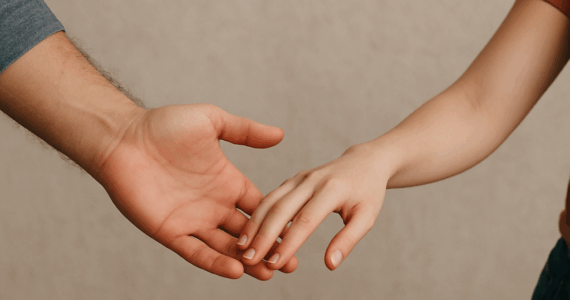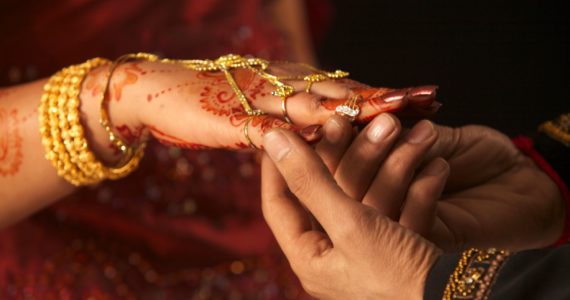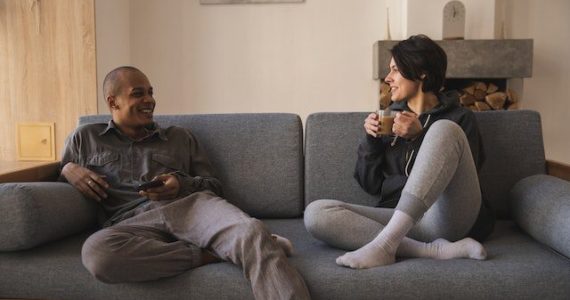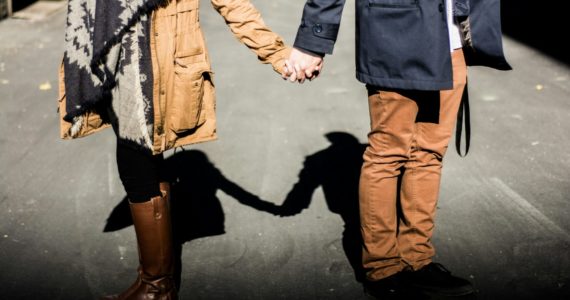Source:
A major part of creating a beloved community is the creation of a family but a Muslim marriage crisis is at our doorstep.
Men and women who really want to get married often face a myriad of issues in finding a good match. The issues are as diverse as the American Muslim community scattered all over the country. Meeting venues and forums are few and this seems to be one major deterrent to suitable marriages.
Adherence to cultural norms and expectations, generational disparity and the neglect of the Islamic standard for the choice of partners are also hurdles single American Muslims face.
An Epidemic: Unmarried and over 30
There is an extraordinary number of very educated women in their thirties and above who have not found a spouse. As intelligent, educated, single women venture to find men to set the cornerstone for a family, they cannot find suitable matches. Women in their late 20s and early 30s, urged to be educated all their lives, settle into their careers or studies, suddenly become less desirable mates to some men.
Another phenomenon faced by several ethnic communities is that many educated men marry outside of their community, race and religion. They are not as bound by the ticking biological clock factor and can usually (not always) find a wife when they get serious about marriage.
Nawaz Khan*, in his 70s, has coffee with his wife in the lobby of the Walter E. Washington Convention Center. He is in tears, worried about his very well-educated daughter’s prospects of finding a husband. They are here to attend the matrimonial banquet. He is amongst the many worried parents at the ISNA convention.
At any Muslim marriage event, there are more females attendees than males. The ISNA marriage banquet sold out for the women’s section weeks in advance, while men strolled in at the last minute. Al Rahmah Marriage Bureau in Baltimore has two women for every man in its database. At a local marriage brunch, many of the women attending were born and raised in the US, educated and articulate, while most of the men were first generation immigrants, without large local networks.
Muslim community leaders are taking notice and some are calling it an epidemic. Shuyukh with large social media following often bring up the topic on their timelines.
“We are modeling for our community the lack of marriages, single families and broken homes, that good practicing sisters may never get married. So, if you are a young girl looking at the life of a mu’min versus the life of the dominant culture, the dominant culture may seem more alluring and look to have more opportunities than the mu’min life. We should not be surprised if we continue on this path that in another generation we end up with a community who is either not getting married or having more sisters marrying outside their faith and children who become adults who think that having children on their own is the ideal instead of in a two-parent home,” writes Heather-Laird Jackson.
“I know sisters who have started dating because they cannot take being single anymore,” said Sr. Denise*, a divorced mother of two boys from College Park, MD, attending the ISWA matrimonial brunch.
Another troubling point brought up by Muslims across the diaspora was the desperation angle. If a single Muslim woman of any age expresses interest in getting married she has to deal with the stigma of appearing desperate. This is very damaging to the psyche of the sisters in the community.
“’Oh my God, she wants to be married, she is so desperate – astagfirullah…’ this popular statement comes mostly from married females when a single Muslimah shares with her that she wants to be married!! Even [those] who were once in the same situation… it’s like, as a community, we don’t have each other’s back anymore,” laments Naeema*.
“Now, it became a taboo for a Muslimah to say ‘I want to get married’,” says Denise*. “[There is] way too much emphasis on sex. Women are being told that they are desperate, weak, and can’t control themselves.”
Emerging Adulthood
The delaying of the American adolescence experience or the new emerging adulthood stage has also contributed to the delay in marriage, especially, with the high school experience extended by local community colleges. According to the New York Times, in 1960, 77 percent of women and 65 percent of men had, by the time they reached 30, passed all five [what sociologists term as] milestones of adulthood: completing school, leaving home, becoming financially independent, marrying and having a child. Among 30-year-olds in 2000, according to data from the United States Census Bureau, fewer than half of the women and one-third of the men had done so.
Culturally, American society as a whole is seeing this trend of delayed marriages. “Young adults have increasingly come to see marriage as a ‘capstone’ rather than a ‘cornerstone,’” say the researchers at the Brookings Institute. “That is, something they do after they have all their other ducks in a row, rather than a foundation for launching into adulthood and parenthood.”
Surveys conducted by AlMaghrib Institute of its student body found that the main reasons that its students were delaying marriage were parents, finances, education, fear of rejection and commitment for men and fear of control and intimidation for women.
“A lot of men fear rejection and get intimidated. In the meanwhile, women wait for proposals and decide to pursue further education while they are waiting. This, in turn, intimidates men more and they think the women are too overqualified or will not make good ‘Muslim’ wives for them and eventually get married to someone from overseas,” says Shaykh Yaser Birjas of AlMaghrib. Or someone much younger since they can without issues.
“For myself, being financially ready [is important] because it is such a big responsibility, starting a new family,” says Farhan, 33, of Philadelphia, PA. His career goals are the major reason for the delay in his marriage.
Some Immigrant Families Issues
Many immigrant parents tend to disregard the fact that their children are raised in the West, and will, ultimately have some elements of their personality influenced by the West. The evolving identity of Muslims in this country further contributes to the marriage crisis. “My parents seem to have the idea – similar to some other Muslims in Western countries – that a spouse from their country would be better. Better for whom? Better for me or better for them? Is this preference due to the fact that they feel culture, ethnicity, and religion would be better preserved this way?” questions a single Muslimah.
Cultural baggage from immigrant parents is a constant problem in many of the communities, but many are optimistic that the tide is changing. Hayat, an Eritrean-American mother from Washington, D.C., says that she and her friends have moved away from this line of thinking. “Many families who come from war ravaged areas think that the only way they can hold on to their culture is by marrying their children to someone from the same background, but now we face [the] reality that as long as the spouse is Muslim, it is acceptable.”
Elitism plays a big part too in many cases, according to matchmakers I spoke to. A lot of focus is on being financially ready, instead of stability. “I just wish that parents would first look at the character and decency of another human being and their families and then look at their background-culture, language, likes, class, and career,” an attendee at the ISNA banquet gives his feedback.
Dowry is an issue faced by many immigrant families although the context differs from ethnicity to ethnicity. South Asian families with daughters are expected to gift the groom a hefty dowry, whereas in Arab and African communities, the demand for a large mahr deters men from proposing and an offer of too little mahr deters women from accepting. “The most hated sentence [to] Muslim sisters is when men say ‘We don’t marry because you ask for too much dowry (mahr)’. Just because a few females are greedy, doesn’t mean we are all like that,” says Naeema.
In cultures where arranged marriages are prevalent, men and women complain about the interference of the parents; in cultures where it isn’t, practicing Muslim men and women are finding it extremely hard to meet someone on their own.
A sister from the Somali community in Fairfax, VA, where there are a substantial number of unmarried women in the late thirties, vents her frustration. “The issue in [my] community is the expectation of the girl to find a man for herself: unfortunately, in our culture, “arranged” marriages are practiced by few and it is widely expected for the woman to take it upon her shoulders to bring the guy to her parents when she is ready to be married… only few, perhaps a handful of families do arranged marriages… I am a devout Muslimah and my religion tells me to never ever [sic] date a guy, but again, my community and the “social norms” are completely against that… I, along with many Somali females are now in their 30’s and single… The older generation needs to change this disgusting norm,” she says.
A few points specific to African-American Muslims
Black Muslim Americans write about constructs of the perfect Muslim woman and increasingly black men tend to think they will find this ‘Muslim’ bride in the immigrant communities.
When asked in an African American only Facebook forum, created to promote growth with-in the community, what barriers the participants face to getting married, both men and women blame the opposite gender, some playfully, others in all seriousness. Questions posed about marriage dissolved into hostility between the sexes, as women blame the lack of ‘good Muslim men’ and men have idealistic notions of a ‘good Muslim women’.
Some think that media gloom and doom which portrays myths about Black marriages in general may also contribute to the image that singles from this community have of each other.
Colorism and racism are very common experiences faced by a large number of people trying to get married.
Wanting to marrying Young
Aniq Tanwir, a South Asian American, was attending the session on pre-marriage counseling at the ISNA convention. It is a constant struggle with temptations for this outspoken 22-year-old electrical engineer. He lives at home and supports his parents. ‘How do you get to know someone? What if they are really dirty? You can pray for the best but the constraints are a big struggle,” he says. He mentions the trend of ‘halal’ dating where practicing men and women talk and meet, but do not get married.
He is frustrated because he is emotionally and financially ready for marriage but has three older sisters who are in different stages of their academics and medical careers. He will have to wait until his sisters are all married, otherwise it will ‘look weird’, and people from his parent’s social circle will wonder what is ‘wrong’ with his sisters. “I would never want to be the reason for my sisters not to have a wonderful match.” He is okay with marrying someone older and is okay with his sisters marrying someone younger. “It’s not about age, it is about maturity and compatibility.”
Should Muslims marry young to protect themselves or wait until they are emotionally ready for marriage is a popular question asked by the youth. “Don’t rush your marriage until you can do justice,” says imam Muhammad Magid of ADAMS Center, in Virginia. Other local scholars urge younger marriages with room for the couple to struggle, navigating studies, careers and life together.
Instant Islam- Instant Marriage
Converts have their own set of issues. “What works for families from overseas doesn’t work for us. We have so much baggage as reverts,” say R. Kerns, a community activist. Many converts are often urged to get married as soon as they accept Islam. New converts are still learning about the religion and the pressure to get married is very high.
As many do not know their rights and understand differences in opinion, they think the only route to marriage is what is being presented to them. “I don’t recommend this to anyone. You are just learning the religion and getting married just makes the equation harder to solve,” says Kerns. Often with no family or support system, many turn to the imam to act as their wali but, in reality, a majority of the time, the imam does not know them. “I have had people call me late at night to perform a nikkah and act as a wali,” says imam Magid.
Many are influenced into decisions that are culturally unsuitable for them. When women and men are introduced by the imam, they often don’t share their legal or financial history. “That’s what we don’t see in the imam’s office – the two sides of a brother,” says Kerns. “The lives we live as Muslims have to be inclusive of who we are, where we came from. Many of us have dealt with prison, abuse, and need to be deprogrammed.”
Common Villains
Tribalism, even more than racism, is prevalent all round. “We get requests that the candidate must be Indian and not Pakistani, Durrani not Mazari, must be African-American, not African, so we counsel them so they can enlarge their vision,” says Muhammad Jameel, a matchmaker in the Baltimore area for the past 24 years.
There is also an unrealistic focus on physicality all around. Outside the ISNA Marriage banquet, Dr. Parveen Qureshi, a volunteer who has attended enough of them to comment, says that people are too picky; they want someone who looks like a model. People want their ideal spouse who looks a certain way, has a certain job etc. and will not settle for anything else. Why should we compromise before the marriage. “With so many expectations and not many people lowering their expectations, it makes it much harder to find the right person,” says Malik Shabazz.
A woman at a forum at the Islamic Heritage Museum in DC complained of Muslim men pursuing women who were not Muslims, and how her hijab made it hard for her to find a spouse as she didn’t look as ‘sexy’ and could not compete.
Dr. Qureshi also thinks that the marriage banquets arranged by ISNA and others should be the culmination of careful matchmaking prior to the event, not 400 people thrown together in a room. The ISNA convention has provided marriage banquets set up speed dating style for many years, with mixed results . “People can confused when they have so many choices at one time.” Her nephew met a girl he liked but after meeting so many candidates all he remembered about her was her red scarf.
Social media has made it more difficult because there is little accountability involved, and it is easy to cross boundaries. “Once you get bored with talking to someone, it is easy to just drop that whole prospect. Also unrealistic expectations, on both sides, further complicates the issue. I think eligible guys and girls need a more natural and less induced forum to meet, with sincere facilitators who want the best for the single people in our communities,” says Dania*, a single dental student from Arizona.
Increased physical mobility is a hurdle too. Tolo O. is an eligible, eloquent Nigerian man with ties in Maryland. He doesn’t have a wide Muslim social circle or family in NYC, where he lives, to help him find a match. “You can’t just walk up to a woman and ask [do] you want to get married. I have walked up to someone before and was asked ‘Why are you talking to me?’” he says. He wants to find someone like him and doesn’t have much time to go on websites. He is open to being introduced to any race or ethnicity and is currently using the Islamic Center at NYU as a resource.
Divorced or Widowed Men and Women
Divorced and widowed men and women face an even harder road to marriage. “They are divorced, and then they are divorced from the community,” says N.J., a wedding planner in the DC Metro area. She has a recently divorced sister. “The stigma is so huge. She was physically abused by her ex-husband, and now is being emotionally abused by our community.”
EternalGarment.com, endorsed by 45 scholars, is a new website that caters to previously married men and women. “I had such a hard time getting remarried after my mutual divorce,” said Reza ul Hasan, the founder of Eternal Garment. Some masajid have started matchmaking services such as Salaam Nikah, a local service offered for divorced and widowed Muslims by the Islamic Center of Northern Virginia.
Shortage of Resources
The shortage of resources in local communities is staggering as every person interviewed complained about the lack of resources. “Imams don’t get back to you, and by the third call you feel so worthless,”1 expresses Denise*.
Imams say that they are overwhelmed with other duties. Some do not have any expertise or interest. Others do not want to take on the responsibility of making a bad match and say that this is a communal responsibility. “This is a community wide issue and all parts of the community need to come together to work on it,” says imam Tahir Anwar. Others are confined to their own masajid and circles.
Many religious leaders do take an active role in arranging events and suggesting matches to their community members. Imam Magid holds more intimate singles gatherings, participants gather in groups and talk about the Qur’an and characteristics of husband and wives. Imam Faizul Khan of the Islamic Society of Washington Area conducts the bi-yearly Matrimonial Brunch. Khan has had many success stories, about 20 couples every year for the past decade.
Imams, Islamic Centers, Muslim Student Associations, online marriage sites, local professional matchmakers, volunteer matchmakers (khalas and aunties), active men and women in the community and Facebook groups are some of the options for resources.
In one city a ladies-only tea is hosted by Rukhsana ameen, where females are invited to meet potential candidates for males they know. This unique solution caters to conservative women who do not want to meet men on their own.
Annual matrimonial events are also arranged by Islamic Centers where singles meet and greet in a pre-arranged setting. Islamic Circles is a London-based non-profit that holds specialized matrimonial events in DC, when requested by locals. They held 3 separate events in 2012 for practicing, converts, and professional Muslims.
ISWA caters to all ages. Talib* is attending as a wali for his widowed mother. Muhammad Mustaqeem, a single software engineer from Frederick, MD, is impressed with the event. He feels that the event was held according to Islamic guidance. “It is organized, and we know that everyone here is looking to get married. You get the information; it is just like a job hunt and you go for what you want, you have to be willing to put in your time to look,” he says, “If you are expecting to walk in and find somebody, [that] is silly. Just have patience.” ISWA has close to 400 individuals in its database.
“I treated it like a job hunt looking through pages and pages of profiles to find the right match,” says Reza ul Hasan, founder of EternalGarment.com. There are many other options online: HalfOurDeen.com, SingleMuslim.com, and even those that cater to particular backgrounds, such as shaadi.com, and singleblackmuslims.com.
Muhammad, a man in his late 20’s attending the ISWA brunch, did have issues with the lax nature of sites like SingleMuslim.com and appreciated the Islamic background and personal touch that the brunch provided.
Many American singles express their frustration with the many hours they spend online searching for the perfect person. Al Rahmah Marriage Bureau uses the Muslim Volunteer Matchmakers team, matchmakers that spend these hours on your behalf. Their goal is to help their clients find that perfect person. All MVM Team matchmakers have doctorates from the United States.
“We have many impersonal institutions opening up but those of us whose families come from traditional cultures are not used to this idea. We need another layer of institutions to normalize expectations for our parents,” says Farhan, a recent immigrant. The stigma attached to the use of these institutions has collectively waned in the second and third generations, but individually more singles need to stop waiting and proactively start looking for spouses.
“It is a shame that we see so many beautiful females out there who are waiting to be married, but yet, we as a community have failed them. Everyone says we have a problem in our Muslim community when it comes to marriage, but no one is willing to fix it. I say to anyone who wants to fix this problem to start with their single friends,” says Naeema.
The Muslims in US need more local matrimonial events, regional cooperative databases that shares resources amongst all the masajid and organizations, as well as pastoral care individualized to suit the needs of these diverse communities.
This is an urgent need and a collective responsibility.








